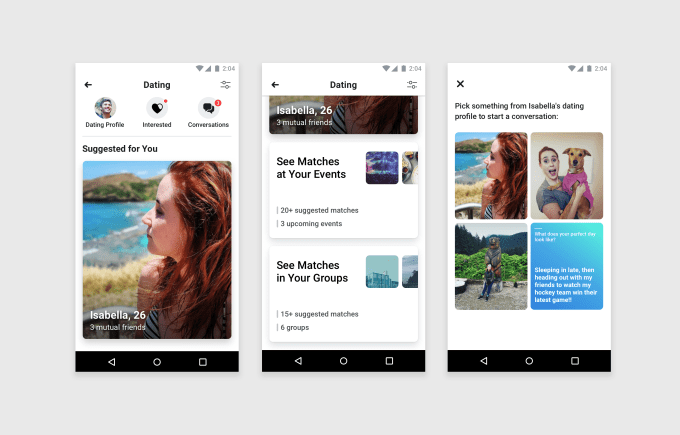
On the heels of Tinder’s plans to go more casual, Facebook is today expanding access to its own dating service, Facebook Dating. First launched two months ago in Colombia for testing purposes, the social network is today rolling out Facebook Dating to Canada and Thailand. The company is also adding a few new features to coincide with the launch, including the ability to re-review people you passed on and take a break by putting the service on pause, among other things.
If that latter feature sounds familiar, it’s because it’s also something dating app Bumble recently announced, as well.
Bumble in September launched a Snooze button for its own app, which addressed the problem many online daters have — the need for a detox from dating apps for a bit. Sometimes that’s due to frustration or just being busy; while other times it’s because they’ve matched with someone and want to give them a chance.
Facebook says you can still message people you already matched while on pause.
Meanwhile, offering daters a chance to give someone a second look is also common among dating apps, though it’s presented in different ways. For example, OkCupid may resurface people you’ve passed on, while Tinder’s newer “Feed” feature lets you keep track of updates from matches that you had earlier decided to ignore.
Second Look will be in Facebook Dating’s Settings, and show people in reverse chronological order. You can go back through your Suggested Matches and even review people you may have accidentally passed on — features for which other dating apps charge.
Also new today is the ability to review a blocked list, support for non-metric units (for things like range and height) and more interactive profile content, including tappable entry points for conversations — like a shared hometown or school.
These features will arrive in the new version of Facebook Dating, rolling out today, the company says.
It has tweaked the user interface a bit, too. Now, when scrolling through Groups and Events to unlock, these will appear vertically, instead of horizontally as before.
Facebook says it’s also working on a preemptive block list, based on user feedback.
This would let you search for people in Facebook Dating who are not already your Facebook friends that you know you don’t want to see — for example, an ex you’ve unfriended but not blocked on Facebook, a family member, etc., the company tells TechCrunch.
You’ll be able to search for specific people regardless of whether or not you know they have a Dating profile, and doing so won’t reveal to you if that person has a profile on Facebook Dating or not.
Preemptive blocking is actually fairly clever, given that many dating apps today surprise you with people you’d rather not see.

Originally announced at F8 this May, Facebook has already figured out some of the larger details about how it wants its dating service to operate. That includes its decision to limit users from expressing interest in no more than 100 people per day, and other settings to open the service to matching with strangers or with friend-of-friends.
There’s a certain (evil) genius in launching a Facebook Dating service, given that Facebook is already the place people go — along with Instagram — to research their new matches and potential dates, once things progress to that point. Plus, the service can leverage Facebook’s data. After all, if anyone knows who you are and what you’re like, it’s them. That could save users time in answering the “getting to know you” questions some apps pose to their users to help perfect their matching algorithms.
It also helps that Facebook is positioning the service for those who want relationships, given the leading dating app — Tinder — is known for the opposite. Match is preparing to focus Tinder more on young, casual dating, then build out Hinge for those interested in serious dating.
Facebook’s challenge is that user trust in the company today is lacking. And dating is something many considerate very private — not something they’d want exposed on a network where they’re connected with work colleagues, industry peers and extended family. While Facebook vows to maintain user privacy, its track record on this front is poor, which could limit the service’s growth.
Facebook has not said when the service will launch in the U.S., nor has it detailed the number of signups to date.
“We don’t have any specific metrics to share, but we’ve been pleased with the response in Colombia thus far and are excited to roll it out to Thailand and Canada,” a spokesperson said.

